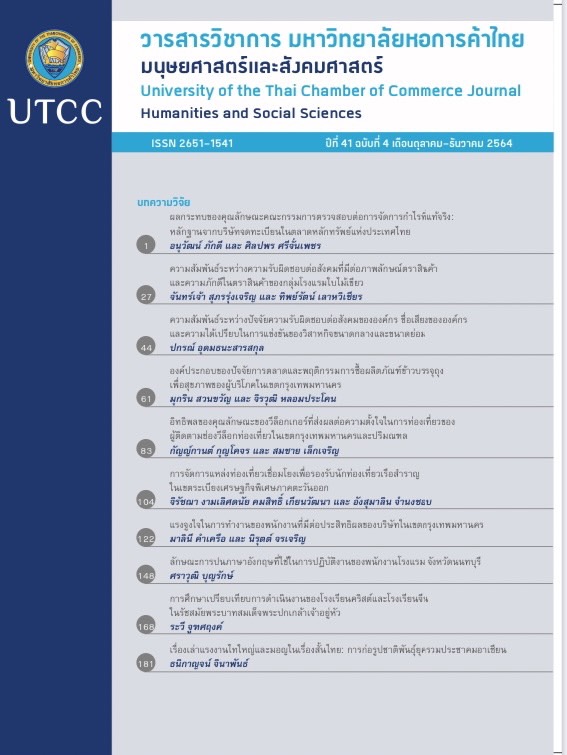The Comparative Study of Christian and Chinese Schools Operation During the Reign of King Prajadhipok
Main Article Content
Abstract
This research aims to study the operation and comparative study of Christian and Chinese schools’ operation during the reign of King Prajadhipok (King Rama VII). This qualitative research was conducted in accordance with analyzing the preliminary and secondary documents. The research found that during the reign of King Prajadhipok Christian schools and Chinese schools are successful in providing education. Especially in the language and profession Christian school can run well by reducing the role of missionaries in schools to open more opportunities for students. Despite the high tuition fees parents are confident to send more children to study. As well as building a reputation as a leading school and have a good relationship and is always trusted by government agencies. The Chinese school is trying to operate according to government policies. But the problem of not teaching Thai language and teaching political doctrines, especially nationalism and communism, which flows from the Chinese side became a problem that has been focused on the Siamese official. However, Christian schools and Chinese schools all have the same status, which is the private school and must be in the same regulatory standards. The government tries to balance the management in order not to look too lenient for Chinese schools and too strict for Christian schools.
Article Details

This work is licensed under a Creative Commons Attribution-NonCommercial-NoDerivatives 4.0 International License.
ลิขสิทธิ์ของบทความ
ผลงานที่ได้รับการตีพิมพ์ถือเป็นลิขสิทธิ์ของมหาวิทยาลัยหอการค้าไทย ห้ามมิให้นำเนื้อหา ทัศนะ หรือข้อคิดเห็นใด ๆ ของผลงานไปทำซ้ำ ดัดแปลง หรือเผยแพร่ ไม่ว่าทั้งหมดหรือบางส่วนโดยไม่ได้รับอนุญาตเป็นลายลักษณ์อักษรจากมหาวิทยาลัยหอการค้าไทยก่อน
References
ชาญวิทย์ เกษตรศิริ. (2543). 2475: การปฏิวัติสยาม (พิมพ์ครั้งที่ 2). กรุงเทพฯ: มูลนิธิโครงการตำราสังคมศาสตร์และมนุษยศาสตร์.
ณรงค์ พ่วงพิศ. (2514). นโยบายเกี่ยวกับการศึกษาของคนจีนในประเทศไทยในรัชสมัยพระบาทสมเด็จพระปกเกล้าเจ้าอยู่หัว (วิทยานิพนธ์ปริญญามหาบัณฑิต ไม่ได้ตีพิมพ์). วิทยาลัยวิชาการศึกษาประสานมิตร, กรุงเทพฯ.
ปกเกล้าเจ้าอยู่หัว, พระบาทสมเด็จพระ. (2471). รวมใจความพระราชดำรัสในการเสด็จพระราชดำเนินเยี่ยมโรงเรียนจีน เมื่อเดือนมีนาคม พ.ศ. 2470 กับคำแปลเป็นภาษาจีน และภาษาอังกฤษ. พระนคร: โรงพิมพ์โสภณพิพรรฒธนากร.
เปรมา สัตยาวุฒิพงศ์. (2559). การศึกษาในสมัยรัชกาลที่ 7: ขยายโอกาส มุ่งคุณภาพ พร้อมคุณธรรม. กรุงเทพฯ: มูลนิธิประชาธิปก-รำไพพรรณี.
พระราชบัญญัติแก้ไขพระราชบัญญัติโรงเรียนราษฎร์ พุทธศักราช 2470. (2470, 5 กันยายน). ราชกิจจานุเบกษา, เล่มที่ 44 ตอนพิเศษ, 176-177.
พิชัย รัตนพล. (2512). วิวัฒนาการการควบคุมโรงเรียนจีน (วิทยานิพนธ์ปริญญามหาบัณฑิต ไม่ได้ตีพิมพ์). สถาบันบัณฑิตพัฒนบริหารศาสตร์, กรุงเทพฯ.
พุฒิพงศ์ พุฒตาลศรี. (2552). การเผยแผ่คริสต์ศาสนาในสมัยพระสังฆราชเรอเน มารี ยอแซฟ แปร์รอส พ.ศ. 2452-2490 (วิทยานิพนธ์ปริญญามหาบัณฑิต ไม่ได้ตีพิมพ์). จุฬาลงกรณ์มหาวิทยาลัย, กรุงเทพฯ.
รวิพรรณ จารุทวี. (2552). โรงเรียนจีนในมณฑลกรุงเทพฯ พ.ศ. 2461-2475 (วิทยานิพนธ์ปริญญามหาบัณฑิต ไม่ได้ตีพิมพ์). จุฬาลงกรณ์มหาวิทยาลัย, กรุงเทพฯ.
วารุณี โอสถารมย์. (2524). การศึกษาในสังคมไทย พ.ศ. 2411 - พ.ศ. 2475 (วิทยานิพนธ์ปริญญามหาบัณฑิต ไม่ได้ตีพิมพ์). จุฬาลงกรณ์มหาวิทยาลัย, กรุงเทพฯ.
วิวัฒน์ แพร่สิริ. (2543). วิวัฒนาการและอนาคตภาพของการศึกษาคาทอลิกกับการพัฒนาสังคมไทย (วิทยานิพนธ์ปริญญาดุษฎีบัณฑิต ไม่ได้ตีพิมพ์). จุฬาลงกรณ์มหาวิทยาลัย, กรุงเทพฯ.
วุฒิชัย มูลศิลป์. (2541). เมื่อเริ่มปฏิรูปการศึกษาในสมัยรัชกาลที่ 5-รัชกาลที่ 7. กรุงเทพฯ: เลิฟแอนด์ลิพเพรส.
สภาการศึกษาคาทอลิกแห่งประเทศไทย. (2545). 336 ปี การศึกษาคาทอลิกไทย. กรุงเทพฯ: ผู้แต่ง.
สุนิตย์ แสงขำ. (2527). บทบาทของมิชชันนารีนิกายโปรเตสแตนท์ในการจัดการศึกษาภาคเอกชนใน
ประเทศไทยระหว่างปี พ.ศ. 2367-2475 (วิทยานิพนธ์ปริญญามหาบัณฑิต ไม่ได้ตีพิมพ์). มหาวิทยาลัยศรีนครินทรวิโรฒ, กรุงเทพฯ.
อาวุธ ธีระเอก. (2560). ภาษาเจ้า ภาษานาย : การเมืองเบื้องหลังการศึกษาภาษาอังกฤษ สมัยรัชกาลที่ 5. กรุงเทพฯ: มติชน.


